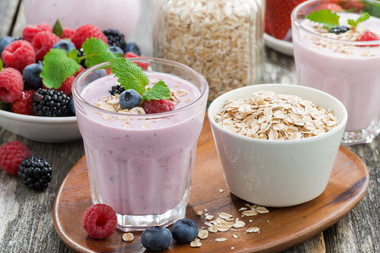Lunch break 101: How to pick the right food to make you better at your job

Picking the right food will not only make you feel more lively, it will also boost your productivity and levels of performance
Jermaine HaughtonHigh-flying managers should eat small portions of food throughout the working day, according to a new food science study, that argues well-timed and well-balanced meals can give bosses a surge in work productivity and performance.
Conducted by Pod, a healthy made-to-go food outlet based in London, the research proposes professionals should consume a number of small meals frequently each day that consist of a healthy combination of complex carbohydrates and proteins.
Many top managers and executives tend to be desk-based, and have to cope with a high brain output to focus on leading their teams, handling stress and completing projects usually over long hours.
Therefore, the latest Pod findings are a sharp departure from the stereotypical perception of a high-flying city professional – which includes large business lunches, eating fast-food late in the evening and sometimes skipping lunch and breakfast all together.
Instead, the report suggests a High Flyers’ day should start with a well-balanced breakfast - a little slow release carb to fuel the brain with some protein.
An example would be eggs, salmon, spinach and a slice of wholegrain toast to provide energy, omega 3 and antioxidants for cognitive function and pantothenic acid for stress.
For lunch, managers should focus on eating something light and easy to digest.
Large high-refined carbohydrate lunches are to be avoided, the study explains, because they cause blood sugars levels and energy to rise then plummet. This energy volatility leads to the infamous ‘food coma’ a few hours after eating, whereby individuals feel lethargic and find it hard to focus.
As well as leading to a very unproductive afternoon, it also increases the likelihood of error.
Top execs are therefore advised by Pod to consume a lunch containing a fist-sized portion of slow release carbohydrates, low fat protein and lots of vegetables or salads.
Late nights and management go hand-in-hand for many High Flyers, and professionals need to have healthy snacks, such as nuts and grains, available to them throughout the spent long hours at their desk.
Snacks such as sweets and crisps should be avoided, as they consist of simple sugars that cause blood sugar levels to rise sharply then drop off, making tasks that require extended concentration and problem solving ability difficult, as your energy will be experiencing a rollercoaster ride of peaks and troughs.
Nuts, grains and hummus are better alternatives as they include complex carbohydrates that release sugars slowly and raise blood sugar levels over several hours.
Structured eating is key, and is one of the major conclusions from the study.
It reads: “Spreading calories and nutrients through the day, matching supply with demand keeps blood sugar levels even and provides energy when it is needed. Calorie distribution will be dependent on an individual’s day but a good base to work off is 20% of calories with breakfast, 10% mid-morning snack, 30% lunch, 10% mid afternoon snack and 30% dinner.”
With the brain using more energy than any other organ in the body, failing to continually feed the brain of its required nutrients can cause brain impairment.
Therefore, managers should focus on implementing a variety of important nutrients – including vitamin B complex, vitamin C, calcium, zinc, magnesium, iron and omega 3 – into their diet.

Press & Media Enquiries
For more information or to request interviews, contact CMI's Press Team on 020 7421 2705 or email press.office@managers.org.uk


